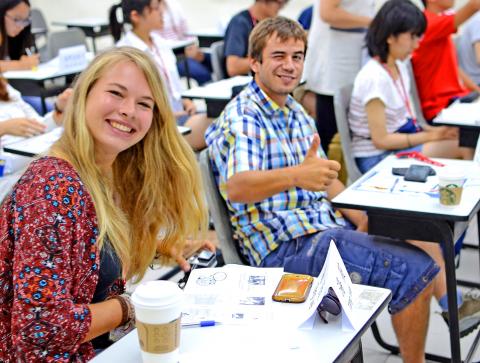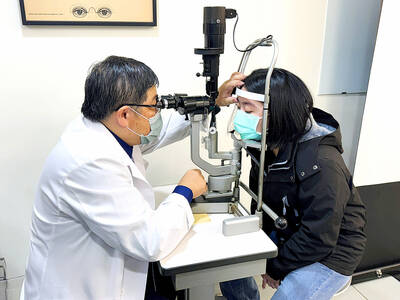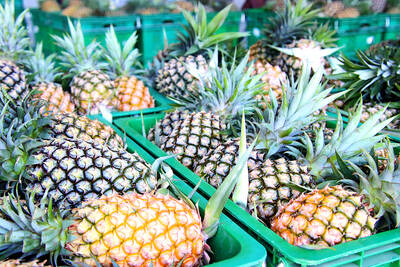Students from five countries took part in this year’s Chinese Language and Taiwanese Culture Experience Camp organized by the Southern Taiwan University of Science and Technology in Greater Tainan. Through cultural courses and visits, participants gained a deep-reaching experience of Taiwan’s folklore, customs and friendliness. The program has been a fine example of civic diplomacy for Taiwan.
This year 44 students from 16 sister institutions in Japan, South Korea, Germany, Austria and the Philippines took part in the camp, along with three accompanying teachers. As well as studying Chinese, the participants gained a deep understanding of the lifestyle of this treasure island of Formosa through interaction with volunteer study partners from the university.
In addition to Chinese language lessons, the camp’s organizers laid on a variety of activities related to Taiwanese culture, including glove puppetry, Hakka-style blue dying, traditional Taiwanese toys and games, cooking, pottery and so on, as well as trips that gave the participants a good look around the historic city of Tainan.

Photo: Lin Meng-ting, Taipei Times
照片:自由時報記者林孟婷翻攝
The students showed off what they had learned during their short two-week stay in Taiwan through song, drama and other means, and their ability to talk, mimic, joke and sing in colloquial Chinese was quite impressive.
The university says that participation in these experience camps not only arouses students’ interest in learning Chinese, but also gives them a deeper understanding of Taiwan. Many participants say that they hope they will have the chance to visit Taiwan again, or even to come here for further studies, and that they will pass on what they have learned about Taiwanese culture to other parts of the world.
(Liberty Times, translated by Julian Clegg)
南臺科技大學舉辦華語暨台灣文化體驗營,今年共有來自五個國家的學生參與活動,學員們透過文化課程以及參訪,深刻體驗台灣的民俗風情與溫暖人情,為台灣從事了一場美好的國民外交。
此次包含日本、韓國、德國、奧地利及菲律賓,共四十四位學員、十六所姐妹校及三位帶隊老師參與活動,學員不僅學習華語,更透過與南臺科大志工學伴的互動、深入瞭解美麗寶島的風情。
體驗營活動中除了華語課程,也安排多項與台灣文化相關活動,包含布袋戲、客家藍染、台灣古早童玩、烹飪及陶藝等,也帶領學員飽覽古都風光。
學員們並將短短兩週在台灣所學,以歌唱、戲劇等方式展現,說學逗唱的中文口語表演令人刮目相看。
南臺科大表示,透過參與體驗營活動,不僅啟發國際學生學習華語的興趣,同時也讓學員對台灣有更深一層瞭解,許多學員期盼有機會再度來台造訪,甚至進一步來台研讀進修課程,也藉此機會將台灣文化推廣至世界各地。
(自由時報記者林孟婷)

In Taiwan, people can use a platform to rent a power washer for a weekend or share unused garage space for someone’s storage needs. These are examples of the sharing economy, a consumption model that has gained widespread adoption worldwide. This approach allows people to rent or share assets like cars, homes or even services, typically through online platforms. This innovative model poses a simple yet powerful question: why purchase infrequently used items when sharing is more practical? By making useful but idle resources accessible, the sharing economy turns them into sustainable opportunities. Internationally, platforms like Airbnb and Uber have popularized

A: Recently, I’ve been seeing mosquitoes flying around in front of my eyes. The doctor said it’s the “flying-mosquito disease.” B: Flying mosquitoes? What a strange name. A: They’re actually called “floaters” in English, meaning floating debris. When fibrous substances in the vitreous body inside the eyeballs increase, floaters can appear in the visual field. B: Oh my goodness. Can you get rid of them? A: According to ophthalmologist Horng Chi-ting’s research, taking the enzymes of certain fruits is likely to help reduce floaters. A: 我最近一直覺得眼前有蚊子飛來飛去,結果醫生說是「飛蚊症」。 B: 飛蚊症?好奇怪的病名。 A: 英文名稱叫「floaters」, 也就是漂浮物的意思。 因為眼球的玻璃體中纖維化物質增多,導致視野出現漂浮物。 B: 天啊!要怎麼把蚊子趕走? A:

A: What types of fruit enzymes should we take to help reduce eye floaters? B: According to a study published in the “Applied Sciences” journal by Taiwanese ophthalmologist Horng Chi-ting, pineapple, papaya and fig supplements can improve symptoms. A: Pineapples are in season now, so you should munch on more of those to get rid of floaters. B: Not quite. Enzymes can be damaged by our stomach acid if we eat the fruit directly. The doctor says taking fruit enzyme capsules is better for absorption. A: Most importantly, we should reduce our use of personal electronics to prevent floaters from

In Taiwan, 7-Eleven convenience stores can be found on almost every street corner. With over 84,600 stores across 20 countries, 7-Eleven has more locations than any other retail business on Earth. For millions of people, the chain is an important part of daily life, providing coffee, quick meals, and essential items for those __1__. The history of 7-Eleven began nearly 100 years ago in Dallas, Texas. In 1927, the Southland Ice Company began selling blocks of ice that were used to keep fridges cool. Shortly after opening, the company __2__ its offerings to include groceries like milk, eggs, and